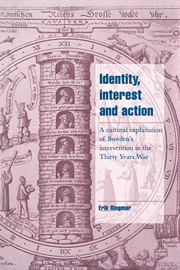 Identity, Interest and Action
Identity, Interest and Action Conclusion: the end of the story?
Published online by Cambridge University Press: 21 October 2009
Summary
In introducing this study I raised the perennial question of why there is war. As we saw, in our time this issue has characteristically been discussed in utilitarian and rationalistic terms. Wars, like all other actions, are supposedly brought about by individuals or groups who act in their interests. When seen from this perspective, however, war participation often fails to make sense. In a war the stakes and the risks are often too high or too unpredictable for rational calculations to be possible, and the very real prospect of losing one's life can make the promise of even large utility gains appear unattractive. War participation, in short, seems quite irrational, and in our time an irrational action is a synonym for an action that is meaningless, misguided or crazy. That people are misguided or crazy is also what we often assume when watching TV reports from obscure wars in faraway parts of the world. Or for that matter, what we may conclude when we think back at the bellicose actions of our own former selves. Why were Swedes and Danes at war for hundreds of years? How could Hitler induce the Germans to attack the rest of Europe? Why did Catholics and Protestants kill each other in northern Ireland? It all seems like madness. Surely we should have been able to resolve our differences in a more peaceful, more reasonable, fashion!
- Type
- Chapter
- Information
- Identity, Interest and ActionA Cultural Explanation of Sweden's Intervention in the Thirty Years War, pp. 187 - 193Publisher: Cambridge University PressPrint publication year: 1996
